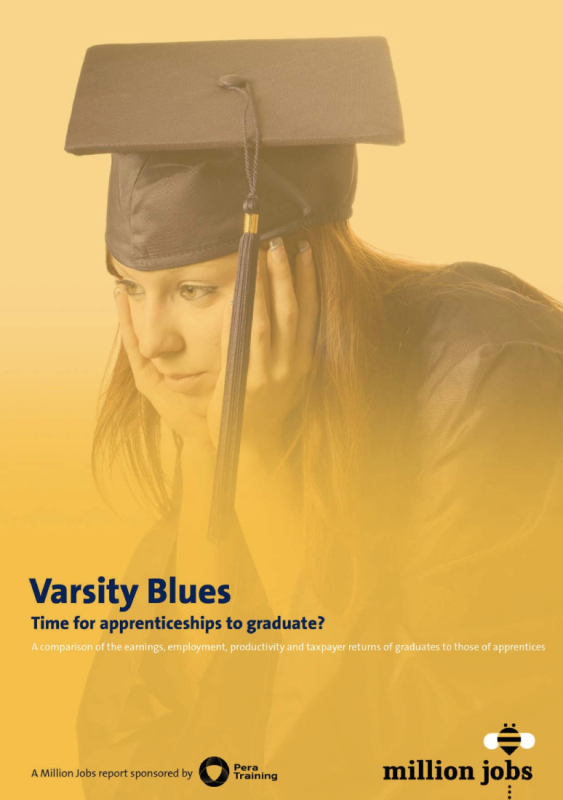Executive Summary
Youth unemployment is a significant challenge facing policymakers. Unemployment takes a heavy toll; it not only harms lives but also has considerable economic and financial implications for governments and society at large.
For young people finishing school their next steps will have a substantial bearing on the rest of their lives. For those looking to continue their learning there are several options available including university, an apprenticeship or college. It is vital that young people make an informed choice based on accurate information. Despite this the Government has yet to commission an analysis to compare directly the merits and weaknesses of the full range of options available to school leavers.
Using data sets from the Labour Force Survey (LFS) British Household Panel Survey HPS and Unistats we have compared two of these options: apprenticeships and university degrees. The purpose of our analysis is to determine the relative benefits these routes offer to young people, employers and taxpayers. Our analysis concludes that contrary to public perception apprenticeships offer more favourable returns both to the taxpayer and to school leavers relative to a significant proportion of university graduates. We also find that both subject studied and university attended have a considerable bearing on lifetime earnings and net returns to the Exchequer.
School Leavers
While there are a wide variety of factors influencing a young person’s choice between an apprenticeship and a degree, our study focuses on two of these: earnings and employment potential. Importantly ours is the first study of its kind to investigate in detail the effects of institution attended and subject studied on future earnings. From a lifetime income perspective, we find apprenticeships are often as competitive and, in many cases, more competitive than a significant proportion of graduate degrees. In terms of employment prospects our findings show the significant detrimental impact the financial crisis took on both apprenticeship completers and graduates. Since 2005, however apprenticeship completers under the age of 25 have broadly enjoyed more favourable rates of employment and unemployment than their graduate counterparts. When looking at employment and unemployment across the workforce graduates fared better.
Due to limitations on the availability of LFS data it was not possible to determine the effect of Higher Education Institution (HEI) type on graduate employment or unemployment. Nevertheless, based on our analysis of forecast earnings it is reasonable to conclude that both institutions attended and subject studied also play an important role in employment prospects. Another shortcoming arising from data limitations was our inability to determine whether individuals were employed in jobs commensurate with their respective skill levels.
Employers
Our study relied upon qualitative evidence to determine the relative merits of degrees versus apprenticeships. Our evidence was in tune with widespread media reports that the introduction of the new modern apprenticeship scheme has seen a renewed sense of employer confidence in apprenticeships. Although there are indications that more needs to be done to inform and educate small business owners to the value apprentices have to offer. This growing interest in apprenticeships contrasts with that of degrees where we find evidence of waning confidence in the qualification among employers.
Taxpayers
In identifying the relative returns to the Exchequer between the two routes we once again sought to determine the impact of HEI type and subject studied. We estimate that the average apprenticeship completer will contribute over two thirds (64 per cent) of the net tax contribution of a graduate from a ‘new’ university. Irrespective of subject studied graduates provide a greater net return to the Exchequer than the average apprentice although the margins for certain subjects are slim).
Graduates that have studied degrees classified as ‘media & information studies’ contribute the least amount of tax revenue with an average of £248,517 or £42,398 more than the average apprentice (£206,119). For ‘arts’ graduates the divergence grows to £54,198 while for those studying for a ‘humanities’ degree the difference is £81,558.
For ‘new’ university graduates the premium over apprentices falls further. ‘Media & information studies’ graduates contribute the least to the Exchequer over their working life: £217,757, or £11,638 more than the average apprentice. For ‘arts’ graduates the difference is £22,438, while for those with a humanities degree the difference increases to £47,518. Using NVQ levels 4 and 5 as a proxy, our analysis suggests higher level apprentices provide 65 per cent of the net return to the taxpayer compared to the average university graduate and 73 per cent of the return from a ‘new’ university graduate.
Higher level apprentices provide a net return only 5 per cent below that for the average graduate studying a discipline classed as ‘media & information studies’. After accounting for HEI type we can see that ‘new’ university graduates in the ‘arts’ and ‘media & information studies’ provide net returns below those of higher level apprentices. The respective percentage differences are 3 and 8 per cent. A shortcoming of this approach however is that it only focuses on the expected net Exchequer returns on an individual basis. It fails to account for the considerably larger investment required to realise graduate returns relative to those for an apprentice. On a per pound basis the returns become significantly more favourable for apprentices (£74:1) compared to those for the average degree (£57:1). The only degree subjects to generate a per pound return more than those of an apprenticeship are ‘medicine’ and ‘engineering’. The per pound return of an apprenticeship relative to a degree become even more pronounced when HEI type is accounted for.
Graduates from ‘new’ universities enjoy a less favourable rate of return than the average graduate. On a per pound basis the returns for graduates from ‘new’ universities are 6 per cent lower than those of the average graduate (51 per cent compared to 57 per cent).
The only ‘new’ university degree course to provide a more favourable per pound return relative to apprenticeships is ‘medicine’ at 86 per cent. An important consideration is the proportion these various degree subjects account for in the total number of degrees. Whilst medical degrees are the most lucrative for the Exchequer they make up only 3 per cent of the total number of degrees awarded. In contrast, the three subjects offering the least favourable returns to the taxpayer: ‘humanities’ ‘arts’ and ‘media & information studies’ constitute one fifth (20 per cent) of all degrees. The bottom six subjects in terms of taxpayer returns constitute 60 per cent of all graduate degrees.
Perceptions
As part of our investigation we commissioned a poll of school leavers to analyse their attitudes toward apprenticeships and university. The results of our survey suggest there is much more to be done in terms of providing clear information about the practicalities and career paths provided by apprenticeships. The Government has a responsibility to encourage the take up of apprenticeships among school leavers. Over a quarter (28 per cent) felt that more information provided by the Government would encourage them to consider undertaking an apprenticeship after school or sixth form.
Despite the compelling evidence to suggest that they o er considerably better earnings potential compared to degrees apprenticeships are still seen as a minority option by British school leavers. Only 2 per cent said that most of their peers plan to become an apprentice and just 6 per cent said they are planning on becoming an apprentice themselves. More than half of school leavers felt apprenticeships are of no interest to them.
It is clear apprenticeships are still struggling to acquire social status. Fewer than one in six school leavers said that they are preferred over university by their parents and friends. Most striking is that of those school leavers surveyed they were more than twice as likely to associate university rather than apprenticeships with providing a good long-term earnings potential and job prospects. This suggests apprenticeships are primarily associated with traditional trades and the career paths that these entail rather than opening up prospects within the wider job market despite evidence to the contrary. However, school leavers were notably more likely to associate apprenticeships as opposed to university with providing a clear career path. Considering the rise in tuition fees and the uncertainty of the graduate market this clarity of direction was striking. There are clear drivers to encouraging the uptake of apprenticeships among school leavers. Three in five school leavers not planning on undertaking an apprenticeship say that a guarantee of a job or qualification at the end of the apprenticeship would encourage them to do so while half say that a clearer idea of the earnings potential would have this effect. Emphasising these key attributes could reposition apprenticeships as a desirable and practical route for school leavers.
Summary
Our analysis offers compelling evidence that apprenticeships provide greater returns to the taxpayer and more lucrative earnings potential for school leavers relative to a large proportion of graduate degrees particularly those from ‘new’ universities. We also find that for young people apprenticeships o er a higher average rate of employment and a lower rate of unemployment compared to graduate degrees.
Despite this, our report found that apprenticeships are still seen as a minority option by British school leavers. Only two per cent said that most of their peers are planning on undertaking an apprenticeship and only six per cent said they planned to themselves. More than half of school leavers believe apprenticeships struggle for social legitimacy with less than one in six school leavers saying they are preferred over university by their parents and friends.
School leavers are more than twice as likely to associate university rather than apprenticeships with providing a good long-term earnings and employment potential. This suggests apprenticeships are primarily associated with traditional trades and the career paths these entail rather than opening up prospects within the wider jobs market despite evidence to the contrary.




